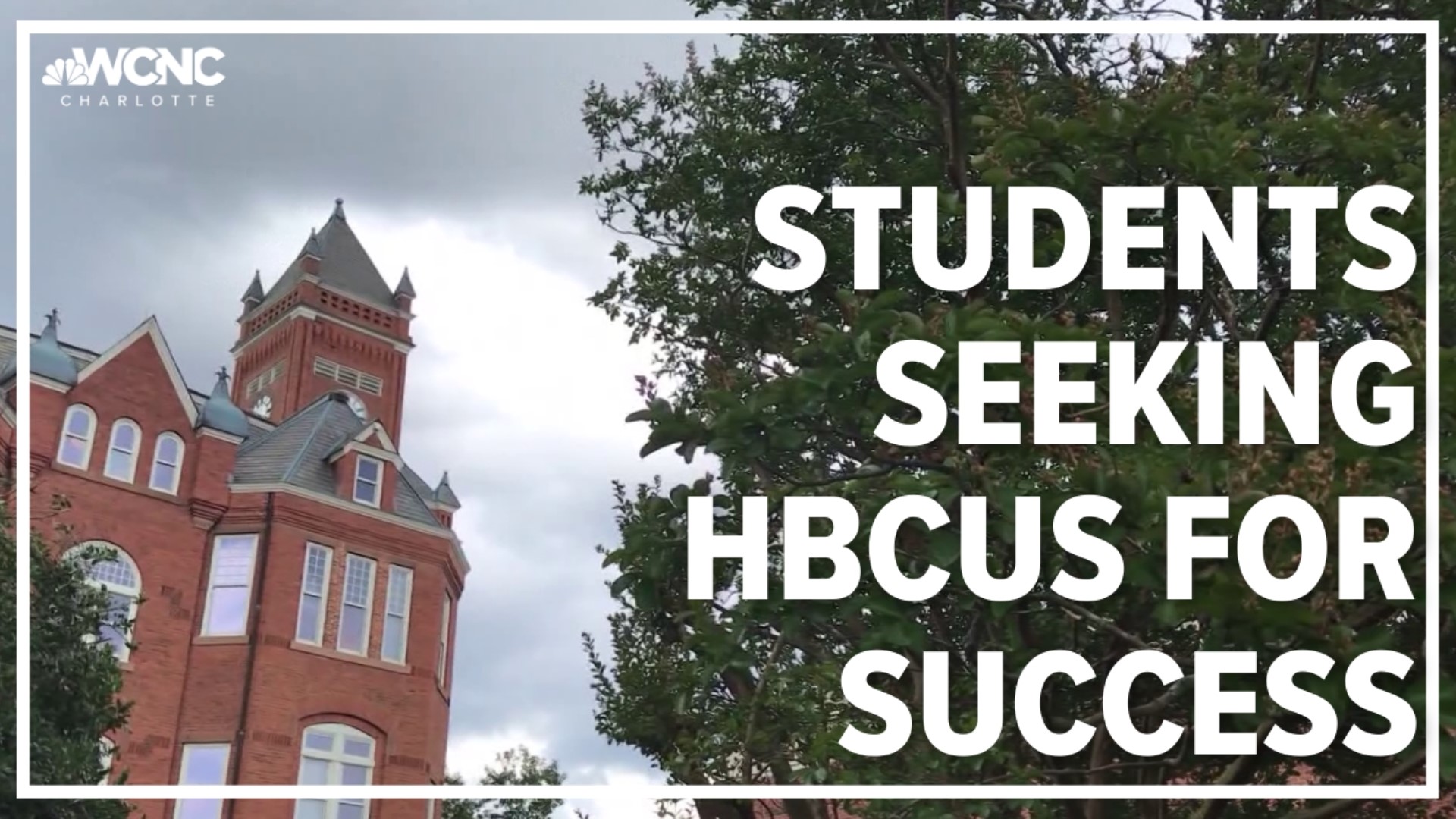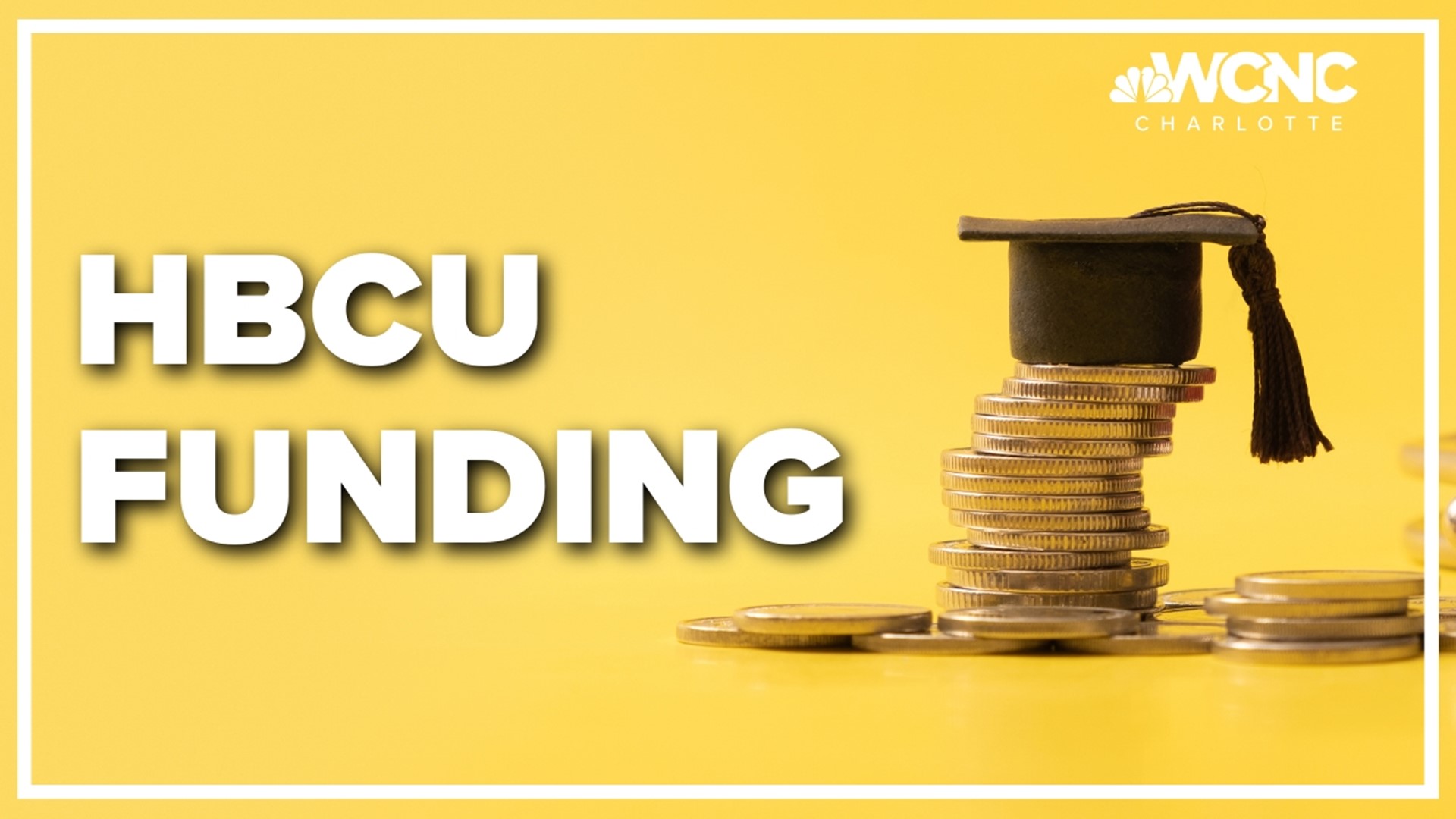CHARLOTTE, N.C. — North Carolina is home to the country's largest number of Black HBCU undergraduate students.
Historically Black colleges and Universities were established in the United States to provide higher education opportunities to Black Americans, at a time when many other colleges denied them access based on their race.
Almost two centuries later since the first HBCU was founded, the institutions have produced some of the most successful and influential Black graduates in the United States.
That legacy is why many students at Mallard Creek High School are interested in enrolling after graduation.
School counselor Stepfon Portlock has a display of HBCUs around the country, including those in North Carolina.
"Everything that we're doing is to try to expose them to different pathways to reach college," Portlock said. "And one of the college options that many of our students are interested in is historically Black colleges."
Portlock said some students he talks to only have HBCUs on their list of possible colleges, like Mallard Creek High School senior Gabriel Orina.
"My mom went to Elizabeth City, my cousin -- one of my cousins went to Winston Salem, the other one went to North Carolina A&T," Orina said. "My grandma also went to Elizabeth City. My other cousin is at Howard right now."
Orina’s family has produced a legacy of Black HBCU graduates.
From the '70s to 2010s, HBCUS saw one of its biggest enrollment increases ever. The Department of Education reported between 2010 and 2021, enrollment decreased by 12% compared to 11% for non-HBCU colleges.
Counselors like Portlock are working to continue to show the value of an HBCU education.
"Finding people that look like you and understand you and can make the most out of what you have, can be very pivotal in building confidence, which is what happens in college," Portlock said.
Portlock did not go to college at an HBCU but spent some of his teaching career at Johnson C. Smith University, a Charlotte-based HBCU.
"I didn't do it as a student, but I did it as a professional and it was, you know, some of my fondest memories are working on that campus and helping connect students," Portlock said.
Orina plans to go into education and join a famed HBCU marching band.
"My mom is a school teacher and basically, she passed it down to my cousins as well and me growing up," Orina said.
It's reported HBCUs produce more than 50% of Black teachers nationwide. In addition, around 70% of African American dentists and physicians earned degrees at HBCUs.
North Carolina is home to the second most Historically Black Colleges and Universities in the United States.
Mya Jackson, a senior at Mallard Creek High School, is heading to Winston-Salem State University.
"I went to tour, it was a great campus. It definitely gave again, that home vibe that I really, really look forward to," Jackson said. "It was a woman-ran campus, which is a big thing for me."
She is interested in politics, just like another well-known HBCU graduate Vice President Kamala Harris who graduated from Howard University.
Jadah Tolson, another Mallard Creek High School senior, is thinking of going to Howard.
"I have a cousin who went to Howard," Tolson said. "So my mom was kind of like, you gotta go, you gotta go. I just think it's an illustrious HBCU. It's one of the top ones."
Howard University graduates include the late actor Chadwick Boseman and former Supreme Court Justice Thurgood Marshall.
Howard University and its successful alum have helped it become the HBCU with the largest endowment, which serves as a perpetual financing pool.
Despite having millions in endowment funds the school, like all other HBCUs, falls billions of dollars behind predominantly white institutions. One study found for every $100 a PWI gets in endowment monies, an HBCU gets $1.
Much of the reason why is rooted in historical racism.
"We've had a chapter in our country's history, where there were not those higher [education] options for certain students and it was born really out of a need for that," Portlock said.
When HBCUs were established as the only option for Black students, they weren’t funded or given land at the same level as white-only institutions.
The Morrill Land Grant College Act of 1862 set aside federal lands to create colleges to “benefit the agricultural and mechanical arts.” Signed by President Abraham Lincoln into law on July 2, 1862, it granted each state 30,000 acres of western land, to be distributed by each senator and representative, and funded the construction of agricultural and mechanical schools.
States passed similar laws to help fund white-only schools at that time.
HBCUs were excluded from these benefits, causing institutional disparities in funding that continue today. University endowments are a number of assets invested by a college or university to support its educational mission in perpetuity.
Universities with the largest endowment funds typically own land that's worth millions.
One example is the University of Texas. The university has an endowment of more than $440 billion. It's in part due to the royalties it makes from oil and natural gas. In addition, the university owns more than 2 million acres of land in West Texas.
The next generation of HBCUs students is taking a stand to correct these wrongs. They are advocating for more HBCU funding and visibility.
"Just being a voice there," Jackson said. "Again, as a first-generation college student, as a person who's been through like low income, I understand the impact of stuff like that."
Congress is continually working on legislation that's mostly stalled waiting to be passed to give HBCUs more federal funding for students and infrastructure at these schools.
Contact Shamarria Morrison at smorrison@wcnc.com and follow her on Facebook, Twitter and Instagram.


